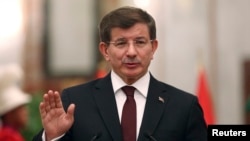Turkey’s prime minister is set to visit Greece on Friday as tensions swell among regional neighbors over energy deposits in the Mediterranean Sea.
Turkish Prime Minister Ahmet Davutoglu will be accompanied by at least seven ministers for his two-day visit.
Sinan Ulgen, a visiting scholar for the Carnegie Institute in Brussels, said a key part of Davutoglu's agenda is Turkey’s stalled bid to join the European Union.
"Greece had actually been a positive contributor to the Turkish-EU relationship in the past decade," Ulgen said. "But since the political instability in Greece, Greece has not really had the opportunity to contribute to the Turkish-EU relationship. It's going to be a discussion where Greece and Turkey should come to an agreement about the positive role that Greece can play in relations for Turkey’s EU bid, which would be a win-win situation."
Over the past decade, trade has improved between Athens and Ankara. On this trip, a large business delegation will accompany the Turkish prime minister. But rising tensions over the divided island of Cyprus are straining these relations.
Athens strongly defends the Greek Cypriots, who are recognized internationally as the only legitimate government in Cyprus, giving them the right to develop recently discovered offshore energy reserves. The northern part of the country, populated by Turkish Cypriots, has not been recognized as a legitimate government, but Ulgen said Davutoglu would be resolute in supporting Turkish Cypriot claims.
Pitch for negotiations
"Turkey has made clear that it will not recognize exclusive competence of Greek Cypriots to explore and leverage offshore energy resources in Cyprus," he said. "But the way to really resolve these differences — and this is something that Davutoglu will tell his Greek counterpart — is to return back to the table of negotiations."
The Greek Cypriots walked away from U.N.-sponsored island unification talks after Ankara sent a research ship into Cypriot waters in October. Tensions were further ratcheted up when a Turkish naval ship was dispatched to the region. A senior Greek diplomat was quoted describing Turkish actions as a gross violation of Cypriot sovereignty.
But international relations expert Emre Iseri of Izmir’s Yasar University said the Turkish prime minister would argue that a peaceful resolution to the dispute, sealed by a pipeline running from Cyprus through Turkey to Greece and Europe, offers a win-win solution.
"In the case of a pipeline, which is actually economically a much more feasible option, you are going to have a common pipeline," Iseri said. "So it’s going to create additional interdependency in the region. It's going to serve peace in the region. That's the argument. But at the moment Cyprus, Greece and Turkey are not on the same page."
Refugee issue
Dealing with growing numbers of refugees fleeing conflicts across the region is also expected to be on the agenda during the Turkish prime minister's visit. Both countries, analysts said, are bracing for the increase.
Another potentially contentious issue is the situation of Greece’s Turkish minority, with Davutoglu requesting to visit the Greek province that borders Turkey. Analyst Ulgen warned that the visit could be diplomatically risky.
"If those messages are seen to be constructive by his Greek counterparts, then of course this could help the bilateral relationship," he said. "But there is always risk that this visit will also be used by some of the radical elements in the Greek political system to attack both the Greek government but also the Turkish leadership."
It has been more than decade since a Turkish prime minister has made such a visit. But analysts point out that raising the plight of the Turkish minority, which Ankara claims suffers religious and cultural discrimination, will play well with his nationalist voting base, an important consideration with a general election due in June.




